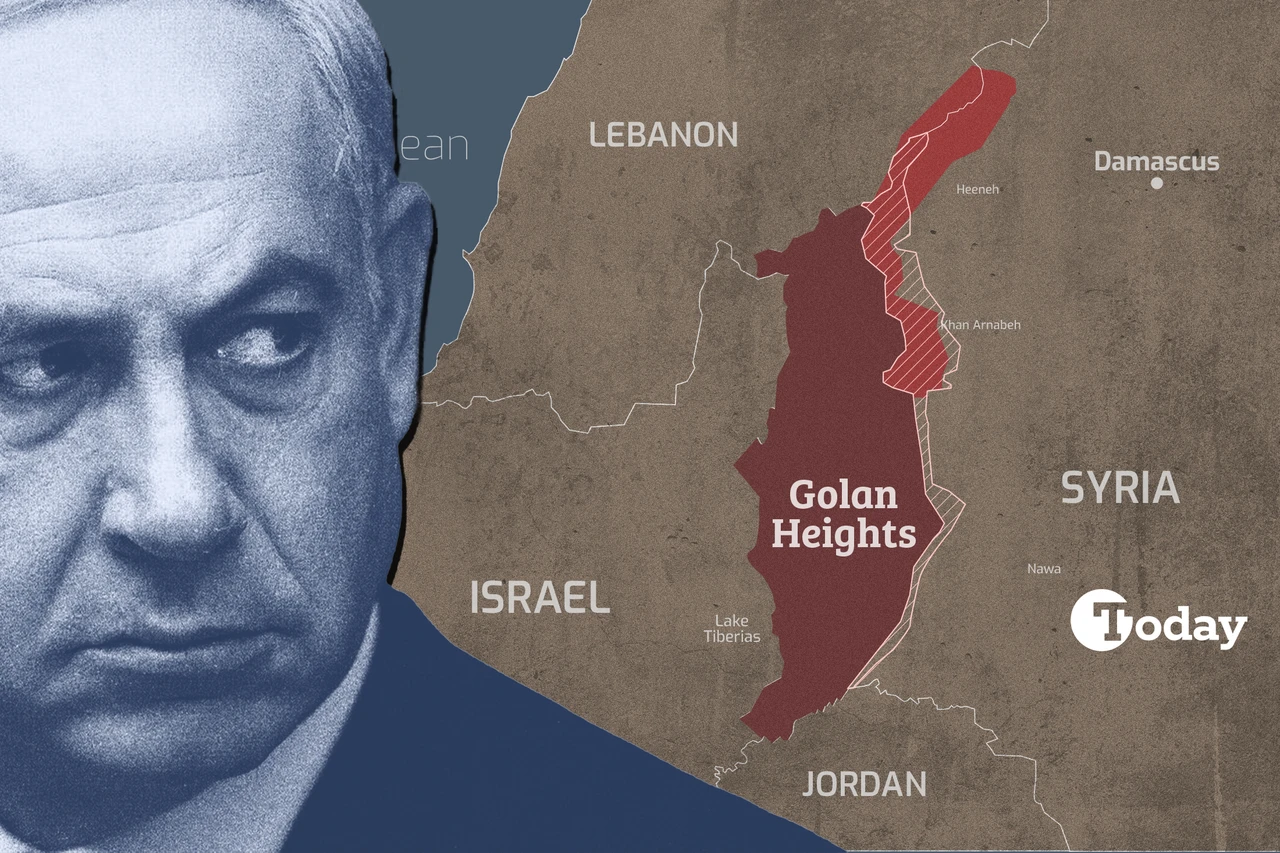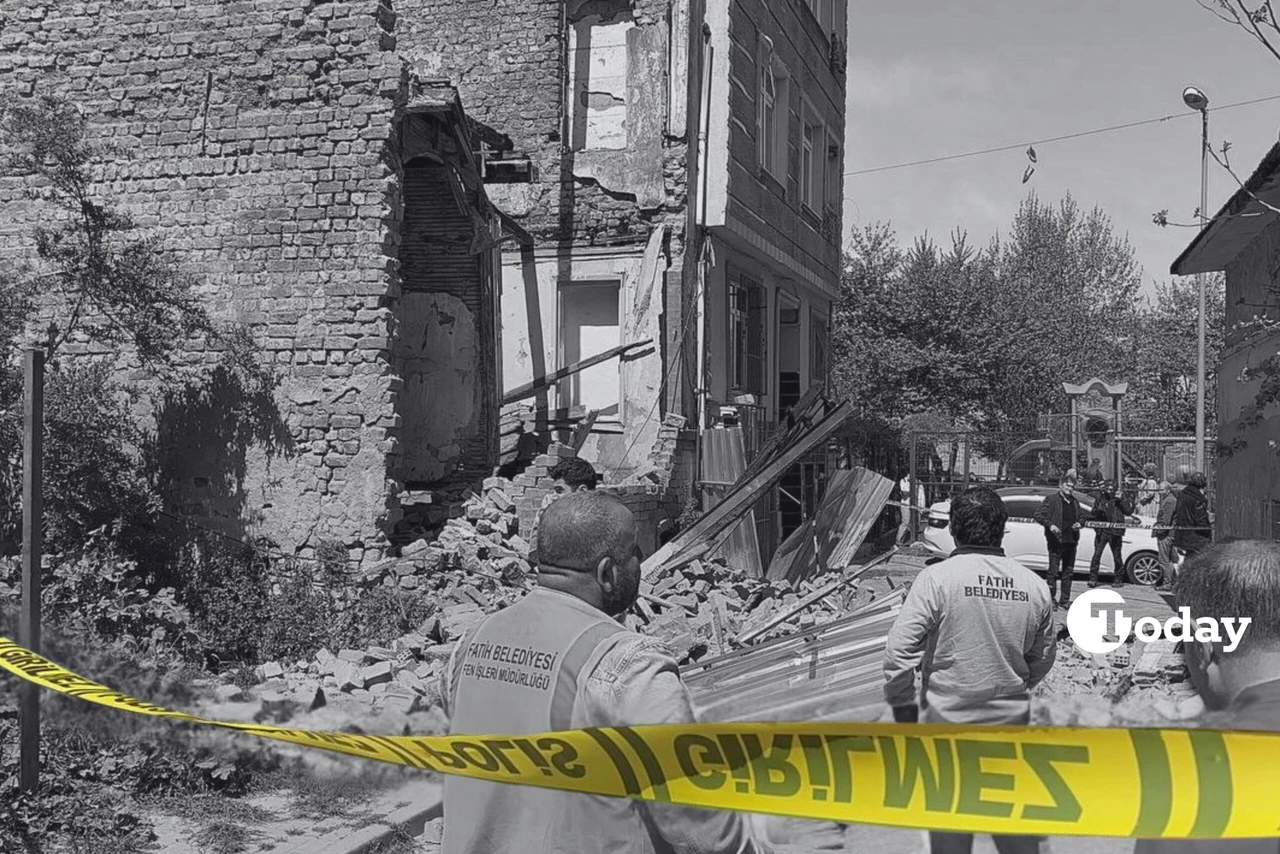Israel’s endgame in Syria: Mapping strategic priorities
 Israel’s growing footprint in Syria under Netanyahu's rule. (Collage by Mehmet Akbas/Türkiye Today)
Israel’s growing footprint in Syria under Netanyahu's rule. (Collage by Mehmet Akbas/Türkiye Today)
Israel faced a period of strategic confusion as Syria descended into chaos during the opposition groups’ rapid territorial gains, culminating in the capture of Damascus.
There were some argued that an even weaker Bashar should be propped up. The collapse of Assads’ regime, after 53 years of repression, left Israel grappling with critical questions about its security and regional strategy.
A prolonged conflict risked entrenching factions hostile to Israel, while Assad’s survival would have ensured continued Iranian influence and Hezbollah’s dominance in the region. With no clear “best” or “worst” scenario, Israel’s leadership shifted focus to pragmatic containment strategies—leveraging the border situation, managing competing regional interests, and maintaining operational flexibility amid its Syria dilemma.
Israel’s dual approach
Israel’s strategy in Syria has emerged as a dual-pronged approach aimed at securing its borders and balancing regional power dynamics. In the aftermath of Assad’s collapse, Israel prioritized securing southern Syria independently by using military force and forging alliances with local communities, including Druze and Sunni Arabs.
The broader objective of the country centers on eliminating Iranian influence, reducing any potential threat that may surge from Sunni or Shiate factions and maintaining military flexibility along its southern front.
At the same time, managing relations with Türkiye will be pivotal to preserving regional balance and enforcing the principle of reciprocity in northern Syria, even as relations remain at an all-time low.

Southern Syria: Connections & land control
In the south of Syria, Israel’s approach isn’t just a short-term fix. Dror Doron, a former senior analyst with 17 years of experience in Israel’s Prime Minister’s Office, told Türkiye Today:
“Back in 2014-2015, Israel reached out to Sunni communities near the Israeli-Syrian border, offering humanitarian aid and trying to build a local, loyal force. The idea was to keep Iranian militias, Hezbollah, and other Shiite groups away from the border.”
According to Doron, currently a senior advisor at the United Against Nuclear Iran initiative, Israel may be looking to bring back that strategy. “We’ve already seen Israeli officials reaching out to Druze communities in southern Syria. I think Israel will push to set up a local Syrian force that’s friendly to its interests and can act as a buffer between the Golan Heights and Syria,” he said.
America-backed Free Syrian Army (FSA) was among the groups receiving assistance from Israel during the 2014-2015 period alongside other local groups and leaders in the area. The objective was to establish a friendly, non-radical element along the border to create stability and counter threats like Iranian militias and Hezbollah.
Doron believes a similar approach may be revisited. “I can imagine a joint effort involving the U.S., Jordan and Israel to reestablish a stable, cooperative dynamic in southern Syria. This was the model in 2014-2015 when Jordan maintained contacts with local populations, Israel did the same, and together the area remained relatively stable,” he noted.
The new leadership on formation in Syria may address challenges in the south by deliberately empowering figures with roots in the Free Syrian Army (FSA). Bolstering their influence in the region might not only help address ongoing issues but also provide leverage in broader negotiations on stability and governance, potentially allowing them to secure key concessions.
Israel is not relying solely on dialogue channels and negotiations, as is expected from its expansionist government.
The Druze community, which Israel has managed well in its internal affairs to date, is seen as a natural ally because of their shared cultural and historical ties. The “blood brothers,” concentrated in the south, will remain a main point to capitalize.
However, the leader of Syria’s Druze, Sheikh Hikmat al-Hijri, has condemned Israel’s incursions into Syria, emphasizing the need to preserve the country’s social and territorial unity.
Despite such opposition, Israel continues to prioritize hard power and rapid military expansion as vital components of its strategy. Pushing territorial limits, Israeli forces have secured Mount Hermon—the region’s highest peak—gaining a strategic vantage point that will be difficult to roll back without significant political or military pressure.
While the country frames the military move as temporary security measures, it has drawn international criticism. The United Nations, Türkiye, Germany and other nations argue that such actions risk breaching international law and escalating tensions in the region.
While international law technically prohibits military actions in demilitarized zones, Israeli officials insist that these maneuvers are a temporary measure aimed at safeguarding national security.
“Israel’s presence in southern Syria reflects a defensive approach rather than territorial ambitions,” said Yuli Edelstein, chairman of the Israeli parliament’s foreign and defense affairs committee.
Yet not everyone shares the genuineness of this assessment. Yonatan Touval, board member and senior analyst at MITVIM, a leading Israeli think tank, sees the country’s actions as a calculated blend of defense and territorial advances.
“While the official stance frames incursions as temporary, the establishment of buffer zones and expanded demilitarized areas hints at underlying territorial interests that could gradually solidify into long-term strategic positions,” he noted. Dismissing claims of outright territorial ambitions, Touval acknowledged concerns over Israel’s growing footprint. “Nothing is more permanent than the temporary in the Middle East,” he added.
Israel’s dual strategy—combining defensive security measures with subtle territorial ambitions—demonstrates its intent to secure long-term safety in Syria, leveraging both alliances and hard power to safeguard its regional interests.
Northern Syria: Addressing Turkish influence
In the north, Israel is aware of the shifting landscape where terrorist groups face mounting pressure to integrate or align with broader national structures. Yet, as Yonatan Touval observed: “Israel likely views Kurdish forces as a counterbalance to Turkish expansion and Iranian proxies.”
The PKK/YPG, which has gained prominence with U.S. backing, remains instrumental to these ambitions. While Israel has historically approached separatist movements with caution, recent developments have reshaped its priorities in response to regional dynamics.
Foreign Minister Gideon Sa’ar reinforced this perspective, describing the “Kurdish people” as “natural allies” for Israel, especially as relations with Türkiye continue to deteriorate. Saar’s remarks drew criticism for failing to distinguish between Kurdish populations advocating for peace and the removal of terrorist organizations and designated terrorist groups such as the YPG.
Ankara’s firm stance against the PKK, rooted in its designation as a terrorist organization by Türkiye, the U.S. and the EU, has also drawn reaction from Israeli policymakers. They argue that Türkiye’s military actions risk destabilizing the region and emboldening extremist factions.
Developing partially in response to Türkiye’s open support for Hamas, much of Israel’s extended indirect support for designated terrorist groups has remained rhetorical, while the diplomatic and practical burden of support falls largely on the United States. Israel, for its part, has aligned closely with Washington’s approach.
Despite these actions, Israel’s direct influence in northern Syria remains limited.
Analyst Dror Doron emphasized these constraints, stating, “Israel has very limited capabilities to assist any ally in the North and certainly cannot prevent Turkish actions.”
Doron acknowledged the complex relationship between Israel and Türkiye, stressing that while the two nations are rivals, they are not enemies. “There is competition, maybe even hostility,” he noted, “but direct confrontation remains highly unlikely” given the significant strategic interests and relations the two countries share.
“Türkiye’s presence in Syria is calculated and unlikely to escalate into clashes with Israel,” said Dror Doron. “Both countries recognize the risks and are expected to exercise caution.”
Touval shares the assessment, noting “Israel perceives Türkiye as a strategic rival and occasional ally,” pointing out that for Israel even though “Erdogan’s ambitions in Syria raise concerns,” Israel’s main focus remains on containing Iranian and extremists’ threats.
In addition, Israel has carried out a series of airstrikes on weapons and production facilities across Syria, stretching from Aleppo in the north to Damascus in the south. The operations were aimed at ensuring that the new Hayat Tahrir al-Sham (HTS) led administration, which has consolidated power in majority parts of Syria, does not pose a military threat to Israel—at least in the medium term.
Iran, Hezbollah: Weakened but persistent threats
The collapse of Assad’s regime has weakened Iran’s regional network, delivering a strategic victory for Israel. Tehran’s diminished influence has disrupted its supply routes to Hezbollah and reduced its ability to project power along Israel’s northern borders.
Iran’s diminishing influence in Syria marks a critical shift in Israel’s security outlook. Yonatan Touval explains that Iran’s weakened presence delivers a triple blow—curbing its ability to arm and support Hezbollah, disrupting its plans for a land corridor from Tehran to Beirut, and potentially weakening hardline factions at home as their expansionist policies face growing setbacks. Yet, Iran’s retreat is far from unconditional.
Dror Doron echoed a similar description, describing the group as being in survival mode under uncharismatic leadership, scrambling to sustain itself without Iran’s lifeline.
Once trained, funded, and armed through Syrian soil, Hezbollah now faces an uncertain future, increasingly isolated and vulnerable.
Yet Tehran’s retreat is far from unconditional. Protests erupted in Syria this week after an old video surfaced showing an attack on an Alawite shrine. The unrest, inflamed by an Iran-linked cleric who had recently prayed for Syria’s new rulers, suggests Iran could be laying the groundwork to reinvent its influence—possibly through another Hezbollah-style proxy aimed at keeping its regional network intact.
For Israel, the challenge now is to capitalize on Iran’s weakened position without underestimating its capacity for reinvention. The loss of key proxies could also push Tehran to fast-track its nuclear ambitions, presenting Israel with a renewed security dilemma.
Israel has already taken steps to neutralize potential threats, targeting Syrian military sites tied to Iran, including chemical weapon facilities. Balancing military gains with diplomatic pressure to contain Iran remains central to Israel’s long-term strategy.
“Israel’s actions are aimed at neutralizing risks before they materialize,” said Eyal Zisser, chair of contemporary Middle East history at Tel Aviv University. “While Iran’s influence has diminished, the long-term threat remains.”

HTS, new administration
The rise of HTS under Ahmed al-Sharaa has introduced another layer of complexity. While al-Sharaa has sought to rebrand HTS as a moderate governing force, skepticism remains regarding its extremist roots.
Israel hasn’t ruled out the possibility of indirect engagement with HTS as part of efforts to prevent further destabilization in southern Syria. Dror Doron suggests that pragmatic dialogue—already supported by U.S. and Jordanian initiatives—could play a key role in containing radical elements and promoting localized stability.
Yonatan Touval added: “I think Israel is more willing to explore dialogue with HTS than HTS is with Israel, which makes formal engagement unlikely in the near term.”
Still, however, indirect and tacit understandings aimed at de-escalation and avoiding immediate conflict could quietly take shape.
Efforts by HTS to form a unified military force in northern Syria have gained momentum, potentially offering Israel a measure of stability in the fragmented region.
Dror Doron highlighted the challenges posed by both fragmented and unified scenarios in southern Syria. “A fragmented south could create security headaches for Israel, but a unified Syria doesn’t come without complications either,” he noted.
Under its broader program to build governing capacity in Syria, Türkiye has already signaled readiness to deepen its involvement. Defense Minister Yasar Guler announced last week that Ankara is “prepared to provide military training to Syria’s new administration upon request.”
If Türkiye achieves its objectives, the potential expansion of its military presence—from existing bases in Idlib to the Mediterranean coast or even Damascus—could present Israel with a far more complex challenge.
“If Türkiye chooses to set ground in Syria in an aggressive way, with all its military might, it would be a major complication for Israel,” Doron warned.
Jordan’s stability
The fall of Assad has raised concerns about spillover effects, including the potential infiltration of extremist groups into Jordan. Israel has signaled its willingness to assist Jordan in maintaining stability, particularly as both countries face shared threats from Islamist factions operating in Syria.
Ensuring Jordan’s security remains a cornerstone of Israel’s broader regional strategy.
Balancing risks, opportunities
As Syria continues to evolve, Israel faces both opportunities and challenges. The weakening of Iran and Hezbollah has created openings for Israel to consolidate gains, but a potential rise of anti-Israel factions, resurrected Iranian proxies and ever-increasing Turkish influence present perceived risks for the country.
Israel’s long-term strategy hinges on maintaining defensive postures in the south, fostering alliances with local actors like the Druze and supporting efforts to balance Türkiye.
Diplomatic outreach aligned with the U.S., coupled with independent targeted military actions, will likely define Israel’s approach moving forward.
Israel’s endgame in Syria reflects a dual approach: focusing on the south and north, ensuring leveraging and balancing, and combining soft and hard power.
By maneuvering on the ground, forging alliances, capitalizing on U.S. efforts, countering Iranian influence, and balancing Turkish security dynamics, Israel aims to maximize its strategic interest—showing little concern for international condemnation or the risk of provocation.



